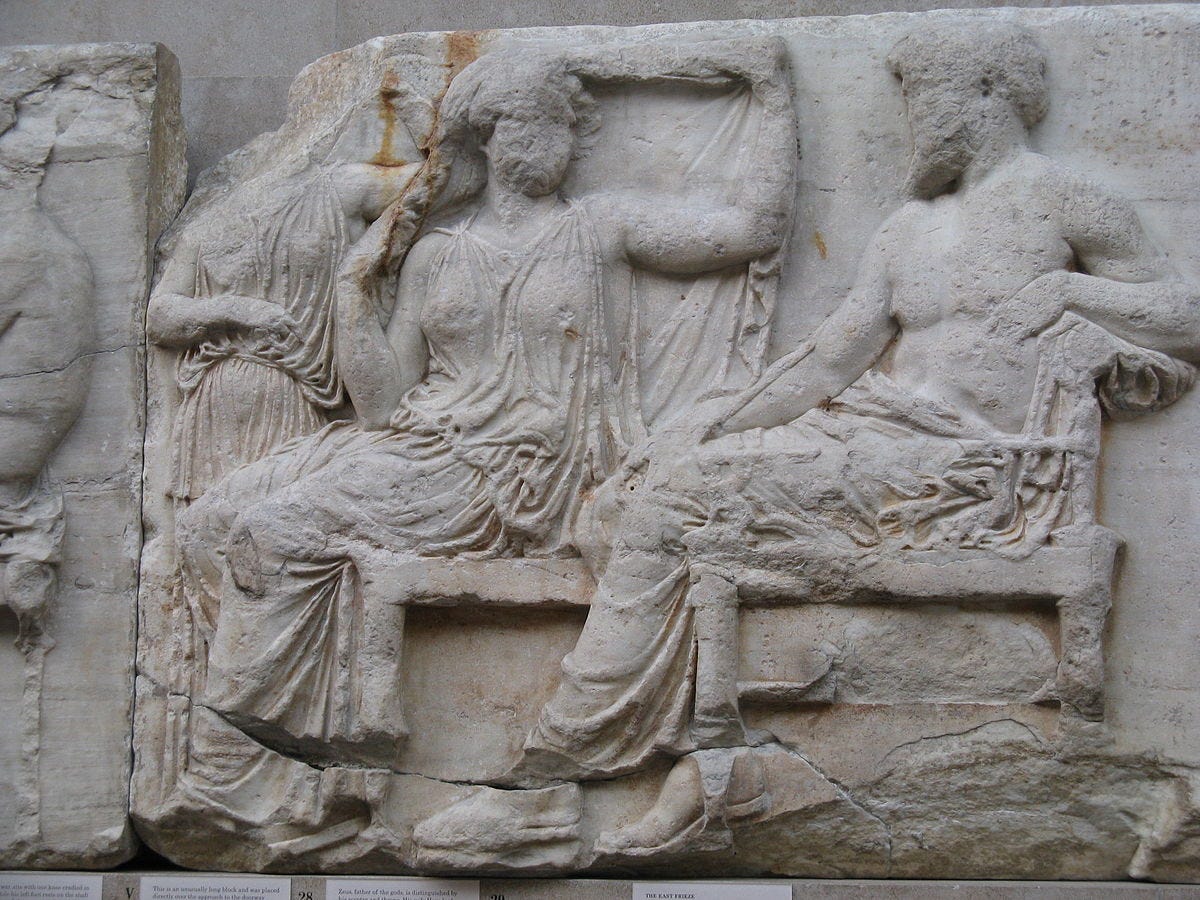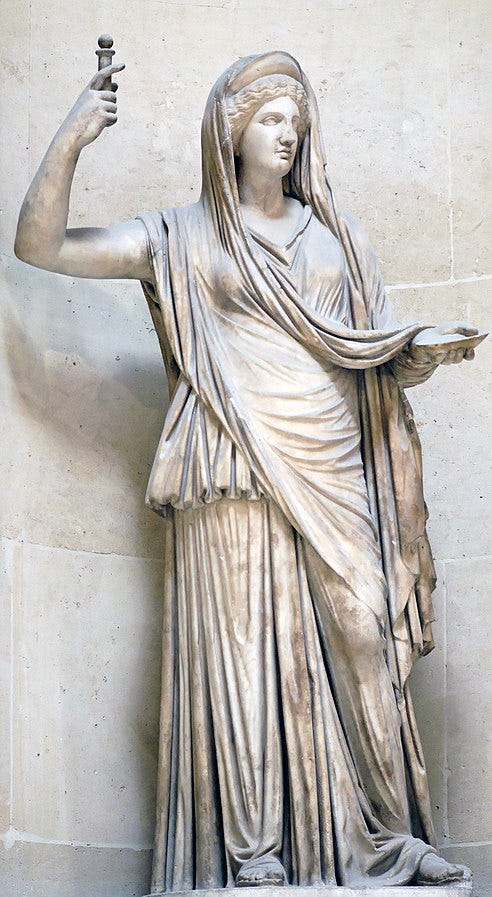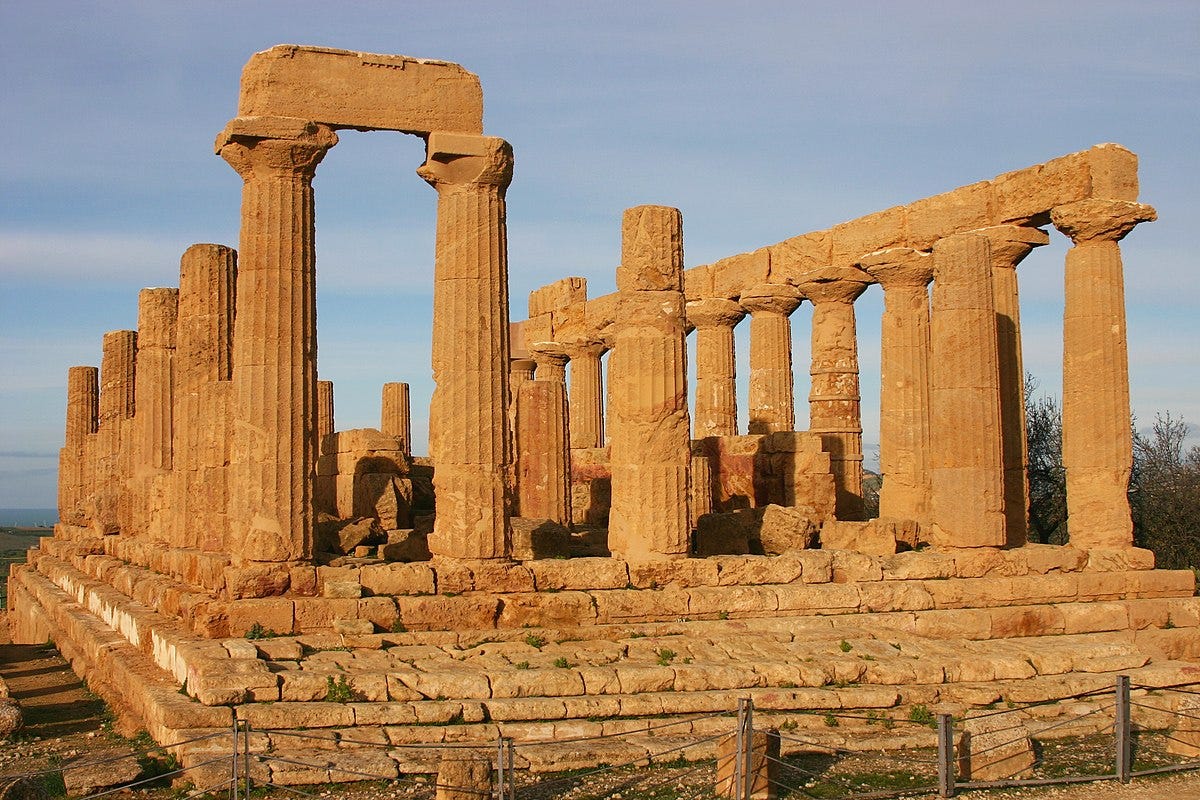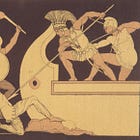Exploring Life and Literature.
"With that, the goddess quickly loosed from her breasts the brocaded band, intricately wrought and glittering, beguiling, bedecked with every kind of enchantment. There is the heat of Love, the pulsing rush of Longing, the chain that binds the heart and soul with hoarse Desire. She slipped it into her hands and whispered, ‘Take this band and hide it between your breasts— its magic will enthrall immortal men and mortal.’"
Dear friends,
In the thick of the Trojan War, the Achaeans find themselves pressed to the brink of despair. The once-glorious Greek forces, who had sailed to Troy with dreams of conquest, now reel under the relentless assault of Hector and his Trojan warriors. The battlefield is chaos—a blur of clashing spears, blood-soaked earth, and weary limbs. The men are battered, their spirits fading under the weight of continuous losses. It is here, in the heart of this turmoil, that Book 14 of The Iliad unfolds—a chapter marked by cunning deception, divine intervention, and a fleeting shift in the fortunes of war.
As the chapter opens, Nestor, the aged king of Pylos, surveys the battlefield. Though old and unable to fight, his wisdom remains sharp. He rides his chariot through the ranks of wounded soldiers and the disheartened Greek leaders, offering counsel. Nestor soon comes upon Agamemnon, Odysseus, and Diomedes—three of the most prominent Achaean commanders—who are grimly assessing their diminishing chances. Agamemnon, weighed down by failure, contemplates retreat. He suggests sailing the fleet home, believing that their decade-long struggle has been in vain. His words are heavy with resignation, revealing a commander worn by defeat. However, his counsel is swiftly rejected by Odysseus, ever the voice of cunning defiance. The wily hero, though weary, will not entertain the thought of surrender. With a sharp rebuke, he reminds Agamemnon that such cowardice would dishonor the memory of the men they have lost and disgrace the warriors still fighting. Diomedes, ever bold, supports Odysseus. He declares that even if Agamemnon himself flees, he and others will remain to fight on. This brief but potent exchange captures the desperation and fractured resolve of the Greek leadership—a moment where the fate of an entire army seems to hang by a thread of fragile courage.
While mortal men debate retreat and valor, Hera, queen of the gods, watches from Olympus. The goddess, driven by her hatred for the Trojans and her desire to see the Greeks triumph, devises a cunning plan. She knows that Zeus, the king of the gods, holds the power to tip the scales of war with a mere glance. His will alone governs the tide of battle. Yet, she also knows that his divine authority, formidable as it may be, is vulnerable to human folly—desire. With this knowledge, Hera resolves to seduce him, knowing that his lust will dull his vigilance.
To enact her scheme, Hera seeks out Aphrodite, the goddess of love. The queen of Olympus pleads with her for assistance, feigning the desire to repair a broken bond of love between Oceanus and Tethys, two primordial deities. Moved by this seemingly noble cause, Aphrodite lends Hera her enchanted girdle—a sash imbued with irresistible beauty, desire, and longing. With this divine weapon of seduction in hand, Hera then seeks Sleep, the gentle but potent god capable of lulling even Zeus into unconsciousness. She offers him a bribe—one of the Graces as his bride—if he will aid her in this deception. Sleep, initially hesitant, recalls how Zeus had once punished him for aiding Hera in the past. Yet, unable to resist the promise of the Grace, he consents.
Hera prepares herself for the seduction. She bathes, anoints her skin with divine oil, and adorns herself in elegant robes that shimmer with celestial beauty. With Aphrodite's girdle concealed beneath her clothing, she becomes an irresistible vision. She floats down from Olympus and approaches Zeus, who watches her arrival with awe. Even the king of the gods, who rules the heavens and holds the power of fate, is ensnared by the goddess’s enchanting allure. His desire ignites instantly. The sight of her beauty overwhelms him, and with honeyed words, he professes his passion. The king of the gods, driven by lust, sets aside his thoughts of the mortal war. Hera’s plan unfolds perfectly. The two lie together on Mount Ida, hidden by a golden cloud, far from the watchful eyes of the other deities. As soon as their union is complete, Sleep, true to his word, casts Zeus into a heavy slumber.
While the king of the gods is overcome by divine sleep, Poseidon, the Earthshaker, seizes the moment. Though bound by Zeus’ earlier decree to refrain from direct interference, the sea god has long seethed with frustration over the Trojans’ advance. With Zeus incapacitated, Poseidon descends to the battlefield. Striding among the Achaeans, his divine presence fills the hearts of the Greeks with renewed strength and courage. The god’s voice, like a roar of crashing waves, commands them to fight with ferocity. He lifts the morale of the battle-weary soldiers, and with their spirits rekindled, the Greeks push back against the Trojan forces. The tide of battle turns.
The scene on the battlefield becomes one of desperate struggle. With Poseidon’s divine power surging through their veins, the Achaeans fight with newfound resolve. Spears fly, shields splinter, and the earth is drenched with blood. The Trojans, caught off guard by the sudden resurgence of Greek resistance, begin to falter. The deception of Zeus, though rooted in seduction and trickery, has shifted the course of the war. For a brief moment, the Greek forces gain the upper hand. Yet the mortals remain unaware of the cosmic chess game being played above them. They fight and bleed, unaware that the gods have temporarily reshaped their fates.
The narrative of Book 14 captures the fragile nature of power, the potency of deception, and the fleeting victories that war offers. Yet, despite its divine and mythic setting, this chapter is startlingly relevant to the modern human condition. The deception of Zeus serves as a reminder that even the most powerful individuals are vulnerable to their weaknesses. Zeus, king of gods, who governs fate itself, is brought low by his own desires. His lapse in judgment, spurred by lust, reveals that even the most authoritative figures are susceptible to manipulation. In modern life, this echoes the fallibility of political leaders, business moguls, and public figures who, despite their influence, remain human—vulnerable to ambition, desire, and deception.
Moreover, Hera’s cunning manipulation mirrors the ways in which people today wield influence through emotional or psychological means. In politics and personal relationships alike, manipulation often comes not from brute strength, but through subtle seduction or psychological strategy. The art of persuasion—whether through charm, temptation, or deceit—remains as powerful today as it was on Olympus.
The intervention of Poseidon, who empowers the Greeks by instilling courage, reflects another enduring theme: the unseen forces that shape human lives. In Homer’s world, divine forces steer fate. In our world, we often experience unseen influences—whether luck, fate, or external circumstances—that alter our course. Poseidon’s role reminds us that while we may strive for control, we are often subject to forces beyond our comprehension.
Finally, the resilience of the Achaeans speaks to the human capacity for defiance in the face of despair. The soldiers, exhausted and broken, fight on despite their suffering. Their refusal to retreat mirrors the modern human spirit—the willingness to persist even when defeat seems inevitable. Whether in personal struggles, social movements, or the battlefields of real-life conflict, the endurance of the Greeks captures the tenacity that defines the human will.
Thus, Book 14 of The Iliad is far more than an ancient tale of divine trickery and war. It is a meditation on power, vulnerability, and the invisible forces that shape human lives. The deception of Zeus is not merely a tale of myth—it is a reflection on the human condition, revealing that gods and mortals alike are bound by their passions, weaknesses, and the unpredictable hand of fate.
"And suddenly Zeus caught her by the wrist and whispered, ‘Now, my cunning, wily wife, where are you rushing? What’s your hurry now? No goddess or mortal woman either could ever hope to rival you in my eyes.’"
In the vast and intricate web of Greek mythology, few deities command as much reverence and complexity as Hera, the queen of the gods. Known primarily as the goddess of marriage, family, and childbirth, Hera’s authority extended far beyond the domestic sphere. She was a deity of formidable power—jealous, vengeful, and unyielding in her pursuit of divine justice and personal retribution. Yet, she was also a figure of profound contradiction. As the patroness of marriage, she symbolized fidelity, yet her own union with Zeus, the king of the gods, was plagued by his notorious infidelity. Through myth, art, and literature, Hera’s presence loomed large, her influence shaping the fate of both mortals and immortals alike. To understand Hera is to explore not only her mythic deeds but also the broader historical and cultural contexts that shaped her worship and enduring legacy.
Hera’s origins trace back to the primordial gods of Greek cosmology. She was the daughter of Cronus and Rhea, the ruling Titans who were eventually overthrown by their children. Like her siblings—Zeus, Poseidon, Hades, Hestia, and Demeter—Hera was swallowed at birth by her father, Cronus, who feared a prophecy foretelling his downfall at the hands of one of his offspring. According to myth, Rhea conspired to save her youngest son, Zeus, by hiding him away on the island of Crete. When Zeus came of age, he freed his siblings by forcing Cronus to regurgitate them, and together they waged war against the Titans. Following their victory, the Olympians divided the cosmos among themselves. Zeus claimed the sky, Poseidon the sea, and Hades the underworld. Hera, as Zeus’ consort, became the queen of Olympus, ruling beside him and wielding significant divine influence.
As the goddess of marriage and childbirth, Hera symbolized both the sanctity and the struggles of married life. In many myths, she is portrayed as the embodiment of the devoted wife, yet paradoxically, she is also the jealous and wrathful spouse, driven to fury by Zeus’ many extramarital affairs. Hera’s wrath was not directed at her husband but at his lovers and their offspring. The most famous target of her vengeance was Heracles, the demigod son of Zeus and Alcmene. Consumed by jealousy, Hera harassed Heracles throughout his life—driving him to madness, causing him to commit terrible acts, and forcing him to endure the Twelve Labors as penance. Her torment of Heracles reveals a goddess not of maternal compassion, but of divine fury, determined to punish the symbols of her husband’s betrayals.
Hera’s vindictiveness was not limited to Zeus’ lovers. She also lashed out at mortals who offended her pride. The myth of Ixion, a mortal king who dared to lust after Hera, illustrates her lethal power. To test his intentions, Zeus created a cloud in Hera’s likeness, which Ixion embraced. For his transgression, he was bound to a fiery, rotating wheel for eternity. Similarly, Semele, another mortal lover of Zeus, became the victim of Hera’s cruel cunning. When Hera learned of Semele’s affair with her husband, she disguised herself as an old woman and tricked Semele into demanding that Zeus reveal himself in his divine form. Unable to withstand the full power of the god, Semele was incinerated. These tales of Hera’s vengeance underscore her role as a deity of ruthless justice, embodying the unforgiving consequences of betrayal.
Hera’s divine authority extended beyond her vengeful persona. In the Iliad, she plays a central role in the cosmic struggle of the Trojan War. Her hatred for Paris and the Trojans stems from the infamous Judgment of Paris, a mythological event preceding the war. According to legend, when Eris, the goddess of discord, was excluded from a divine wedding, she spitefully threw a golden apple inscribed with the words “To the Fairest” among the guests. Aphrodite, Athena, and Hera each laid claim to the apple. The mortal Paris was chosen to judge the fairest goddess. When Hera offered him power and dominion over the world in exchange for the prize, he refused her bribe, instead awarding the apple to Aphrodite, who promised him the love of the most beautiful mortal woman—Helen of Sparta. Hera’s fury over this slight was immortalized in her unwavering hostility toward the Trojans during the war. Throughout The Iliad, she manipulates both gods and mortals, driven by a thirst for vengeance and a relentless desire to see Troy destroyed.
Yet, beyond The Iliad, Hera’s influence permeates other ancient literary works. In Hesiod’s Theogony, she appears as a key figure in the divine genealogy. She is described as the mother of Ares, the god of war, Hebe, the goddess of youth, and Eileithyia, the goddess of childbirth. These divine offspring reflect her dual nature as a goddess of both life and strife. Hebe symbolizes the eternal youthfulness and vitality associated with marriage, while Ares, born from her union with Zeus, embodies the violent and often chaotic aspects of her temperament.
Hera’s presence is also felt in Pindar’s odes, where she is honored as the protector of marriage and a deity of royal patronage. In Pindar’s Olympian Ode 6, she is celebrated as the goddess who presides over the Olympic Games, emphasizing her importance in the religious and cultural life of ancient Greece. Her connection to the games, held in Olympia, a sanctuary dedicated to Zeus, highlights her place alongside her husband as a divine patron of both religious observance and communal identity.
In Aeschylus’ Suppliants, Hera’s influence takes on a more abstract role. Though she does not appear directly, her presence is invoked through the Danaids, who flee from forced marriages. Their prayers for protection reflect Hera’s role as the guardian of lawful unions. In this context, her divine authority represents the sanctity of marriage, even as she is invoked in opposition to the violent and coercive unions the Danaids resist.
Historically, Hera’s worship was widespread throughout ancient Greece. Her most significant cult center was at Argos, where she was venerated as Hera Argeia, the protectress of the city. The Heraion of Argos, one of the oldest and most important temples in Greece, was dedicated to her. She was also widely worshipped in Samos, where a grand sanctuary known as the Heraion of Samos was erected in her honor. These temples were centers of religious festivals and processions, testifying to her enduring influence in Greek religious life.
Hera’s complex persona has continued to fascinate and inspire throughout history. In Roman mythology, she was assimilated into the figure of Juno, maintaining her association with marriage and childbirth. Her representation in Renaissance art and literature often emphasized her regal and maternal aspects, while modern interpretations frequently explore her darker, vengeful side. In contemporary culture, Hera appears in literature, film, and popular fiction, often depicted as a figure of formidable strength, embodying both the nurturing and destructive forces of divine femininity.
Ultimately, Hera stands as a paradoxical goddess—a symbol of marital devotion and divine fury, of maternal care and merciless vengeance. She is at once the divine protector of lawful unions and the avenger of betrayals. Her presence in mythology and literature captures the volatile interplay between love, power, and vengeance. As the queen of Olympus, she commands both reverence and fear—a divine force whose legacy endures as a reflection of the complexities of power, fidelity, and the tempestuous nature of the human and divine alike.
In Book 14, Hera uses her beauty and seduction to distract Zeus, allowing the Achaeans to gain an advantage. What does this scene reveal about the power dynamics between the gods? How does Hera’s deception reflect the broader themes of manipulation, cunning, and strategy in the epic?
Hera enlists Hypnos, the god of sleep, to aid her in lulling Zeus into slumber. What symbolic significance does sleep carry in this chapter? Does it represent more than mere physical rest—perhaps vulnerability, blindness, or the fleeting nature of divine power?
Reading Assignment for Next Week
We will cover Book 15. In the Fagles translation, this chapter is entitled The Achaean Armies at Bay and covers pages 387-411. In the Wilson translation, it is called Fire at the Ships and covers pages 349-377.
Beyond the Bookshelf is a reader-supported publication. If you are looking for ways to support Beyond the Bookshelf, please visit my support page and see the ways you can help continue the mission of exploring the connection between life and literature.
And I have a tip jar available for those who prefer. Thank you very much.
Until next time,
Previous articles in this series:
If you are a new subscriber or missed any of the previous articles in this series, you can catch up at the link below:
All opinions in this essay are my own unless otherwise noted. Additionally, I have highlighted all sources in the text if needed.














The additional background on Hera was interesting and quite helpful. The description of her seduction of Zeus is reminder of the power of sexual desire, stronger than even the lust for power and wealth, and in extreme instances, life itself. I will say I had a little difficulty dealing with revulsion from the fact that Zeus and Hera are siblings.
Thank you, Matthew, for Hera's backstory. I'm beginning to think that Hesiod should be a prerequisite to Homer. I actually had a minor Epiphany with this chapter, which is that (feel free to correct me if I am wrong) it seems that the Trojans virtually never lie, while the Greeks, including the gods supporting them seem to be quite comfortable lying when it is convenient, and maybe sometimes just for fun.